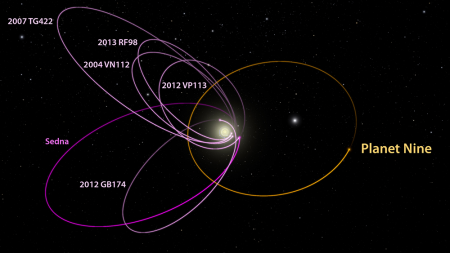 |
| Amazon link |
How else, at a global or grander level, might things go Really Bad? I haven't done a death-by-asteroid novel (yet), but rocks from the sky are popular among my peers. (Though not so much with dinosaurs. Just sayin'.) A recent study suggests that asteroids may pose a bigger risk to us homo saps than formerly supposed. See "Fresh craters point to constant 'churning' of moon's surface." The takeaway: More than 200 new craters popped up on the moon over the past seven years – a third more than expected.
And the moon, after all, is quite nearby ...
New catastrophe-inducing concept ... whatever your thinking about recent climate change(s), said change(s) is nothing compared to, say, what could follow an alteration to Earth's orbit. After so many years of (presumed) stability, could something perturb Earth's orbit? Maybe. See "The mysterious 'Planet Nine' might be causing the whole solar system to wobble."
 |
| Inferring a planet |
Planet Nine (if it exists -- though the inferential support is looking better and better) is way out there: well beyond Pluto. It might not seem likely that an object so remote, even one (inferentially) several times more massive than Earth, could gravitationally disrupt Earth's orbit. But if Planet Nine disrupts, say, Neptune, and Neptune disrupts Uranus, and ... who knows? A plot possibility, to be sure -- just not a near-future story line.
Here's an interesting end-of-everything possibility that caught my eye (and fancy): "Vacuum decay: the ultimate catastrophe." Perhaps that's because the engineer in me appreciates efficiency, and: Of all the ways the Universe might die, vacuum decay is the most efficient.
Is "decay" not dramatic-sounding enough for you? Then consider: Vacuum decay is the ultimate ecological catastrophe ... not only is life as we know it impossible, so is chemistry.
Alas, a universe suddenly rendered devoid of life, and even of chemistry, seems rather plot-limiting. Perhaps I should take that on as a challenge -- while I can.
 |
| Amazon link |
If you're into cosmic apocalypses, there are many more possibilities. I highly recommend Death from the Skies!: The Science Behind the End of the World, by astronomer Phil Plait. (Do not judge this book by its cover. Man, that's hideous.)

































No comments:
Post a Comment